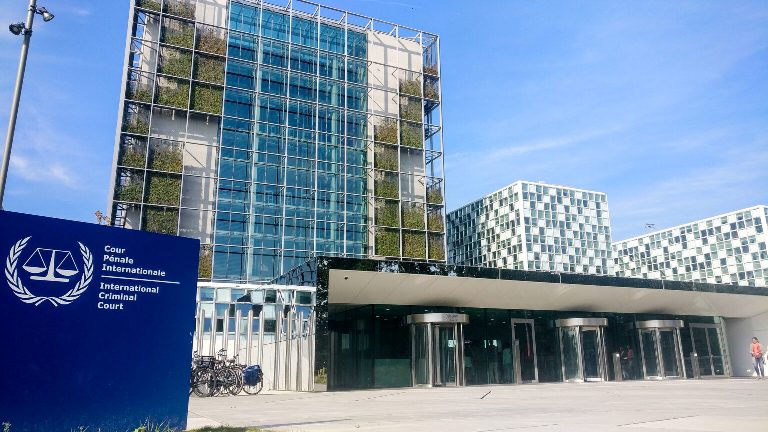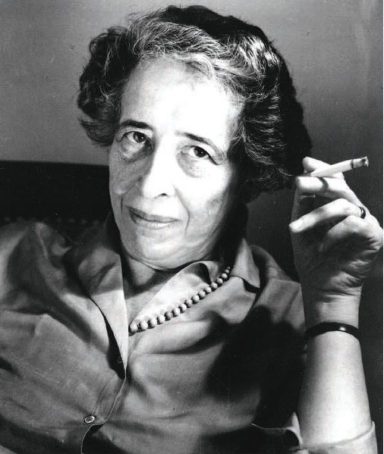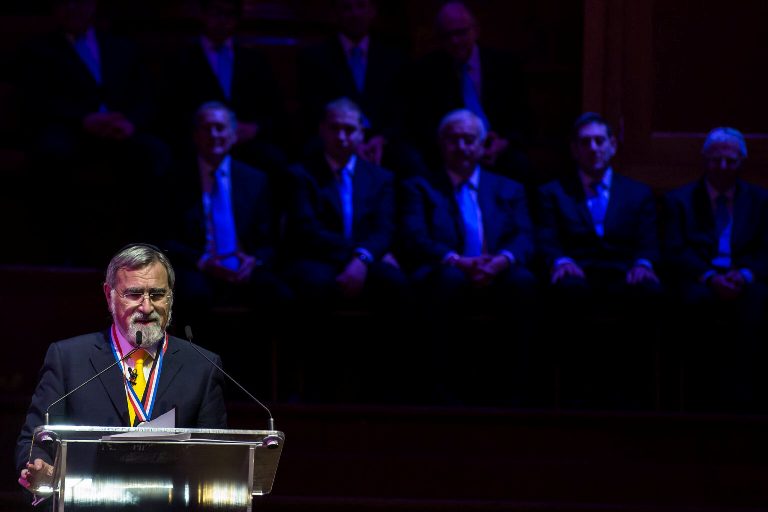Israeli Prime Minister Naftali Bennett, at podium, addressing the UN General Assembly in September. (UN Photo/Cia Pak)
The danger inherent in a Zionist state ideology was recognized even before the Balfour Declaration was announced in 1917, writes Lawrence Davidson.
On Oct. 19, the Israeli Defense Ministry officially labeled six well known Palestinian human rights associations as “terrorist organizations.” Israel uses a definition of “terrorism” that is unreasonably broad. Just about any criticism as well as non-violent resistance to its evolving apartheid regime can and often is deemed “terrorism.”
As this instance shows, this arrangement allows Israeli authorities themselves to terrorize groups that most sane people would recognize as having nothing to do with terrorism.
The six organizational victims of this strategy are Addameer, al-Haq, Defense for Children Palestine, the Union of Agricultural Work Committees, Bisan Center for Research and Development, and the Union of Palestinian Women Committees.
Applying the terrorist tag “authorizes Israeli authorities to close their offices, seize their assets and arrest and jail their staff members, and it prohibits funding or even publicly expressing support for their activities.”
There are only two classes of people who would fall for this deceit: (1) those embedded in the Zionist thought collective — the world of Israel “über alles” (my use of this specific term is explained below); and (2) those politicians and bureaucrats so firmly tied (financially or otherwise) to the various Zionist lobbies that they would be compelled to forgo reason and agree to anything the Zionists say. Much of the Washington power structure falls into this category.
Beyond those categories, people capable of independent thought and in knowledgeable positions condemned the Israeli action:
The Israeli news magazine +972, which has obtained copies of the classified testimony providing “evidence” against the six groups, has characterized the charges as unproven. +972 describes it as a “political attack under the guise of security.” In their estimate the entire case is a hodgepodge of innuendo and assumption, some of it obtained by Israel’s security service, Shin Bet, by threatening witnesses and their families.
Human Rights Watch and Amnesty International, both of which have long interacted with many of the charged groups, condemned the Israeli action in harsh terms:
“This appalling and unjust decision is an attack by the Israeli government on the international human rights movement. For decades, Israeli authorities have systematically sought to muzzle human rights monitoring and punish those who criticize its repressive rule over Palestinians. … Palestinian human rights defenders have always borne the brunt of the repression. … The decades-long failure of the international community to challenge grave Israeli human rights abuses and impose meaningful consequences for them has emboldened Israeli authorities to act in this brazen manner.”
The often clear-sighted Israeli newspaper Haaretz also took exception to the government action.
“The government’s declaration of civil society organizations in the West Bank as terrorist organizations is a destructive folly that tarnishes all of the parties in the coalition and the state itself. The outlawing of human rights groups and persecution of humanitarian activists are quintessential characteristics of military regimes, in which democracy in its deepest sense is a dead letter.”
Besides its habitual and often sadistic persecution of Palestinians, Israel had immediate reasons to silence these six organizations. An analysis given by Open Democracy noted that on Feb. 5 the Pre-Trial Chamber of the International Criminal Court (ICC) ruled that the ICC had jurisdiction over events occurring in Israel’s Occupied Territories. Then, on March 3 the court opened up a criminal investigation into Israeli practices and policies in this area. Open Democracy then explained:
“All six banned organizations have for decades been critically involved in the documentation and monitoring of alleged Israeli human rights violations, war crimes and Apartheid in the OPT [Occupied Palestinian Territories]. … All of this work has been a major evidential basis for the demand to open criminal investigations by the International Criminal Court (ICC).”
In other words, Israel’s “terrorist” canard is, at least in part, the Zionists seeking to obstruct justice. Like most organized groups of law-breakers they prioritize their own interests above those of the community—in this case the international community.
In doing so they undermine inter-community standards of ethics and values enshrined in international law. Ultimately, they see such law as an obstacle to their ideologically driven goal of national expansion and Jewish (that is, the Zionist version of Judaism) supremacy.
Zionist State Ideology

International Criminal Court, The Hague, 2017. (jbdodane, Flickr, CC BY-NC 2.0)
None of this is new. The Zionists have always been this way. Driven by an ethnic-centered, settler nationalism, their incapacity to deal fairly with the Palestinians was recognized even before the Balfour Declaration was announced in 1917. Below are some of the earlier, prescient warnings of the danger to Judaism inherent in a Zionist state ideology.
Ahad Ha-am (the pen name of the famous Jewish moralist Asher Ginzberg) noted as early as 1891 that Zionist settlers in Palestine have “an inclination to despotism. They treat the Arabs with hostility and cruelty, deprive them of their rights, offend them without cause, and even boast of these deeds.”
He warned that such behavior stemmed from the political orientation of the Zionist movement which could only end up “morally corrupting” the Jewish people.
Unlike the Zionist leader Chaim Weizmann, who famously desired that the Jews become a nation like all other nations, Ha-am believed that the return to Zion was worthwhile only if the Jews did not become like other nations. By 1913, Ha-am knew this was not to be, and he rejected the nature of Zionism as it was evolving.
“If this be the Messiah,” he wrote, “I do not wish to see his coming.”
As the issuance of the Balfour Declaration drew nearer, other Jews voiced their worries. In the United States, a letter representative of the Jewish opposition to Zionism was sent by Henry Moskowitz to The New York Times on June, 10, 1917. Moskowitz was a Jewish activist and cofounder of the NAACP. He wrote the following:
“What are the serious moral dangers in this nationalistic point of view from the standpoint of the Jewish soul? First, it is apt to breed racial egotism.”

Political theorist Hannah Arendt. (Flicker Ryohei Noda)
In a 1945 essay, Hannah Arendt, one of the most insightful Jewish political philosophers of the 20th century, described the Zionist movement as a “German-inspired nationalism” (thus my use of “über alles” above).
That is, as an ideology that holds “the nation to be an eternal organic body, the product of inevitable natural growth of inherent qualities; and it explains peoples, not in terms of political organizations, but in terms of biological superhuman personalities.”
In 1948, Arendt and 27 other prominent Jews living in the United States — including Albert Einstein — wrote a letter to The New York Times condemning the growth of rightwing political influences in the newly founded Israeli state.
Citing the appearance of the “Freedom Party” (Tnuat Haherut) led by Menachem Begin, they warned that it was a “political party closely akin in its organization, methods, political philosophy, and social appeal to the Nazi and Fascist parties.” Begin would go on to become one of Israel’s prime ministers. The contemporary Israeli party Likud is a successor of the “Freedom Party.”
Einstein was also a person of moral sensitivity. As such, he turned down an offer to become Israel’s president and distanced himself from both Zionism and the Israeli state. The Zionist treatment of the Arabs had alienated him. In 1938, he observed,
“I would much rather see reasonable agreement with the Arabs on the basis of living together in peace than the creation of a Jewish state. I am afraid of the inner damage Judaism will sustain – especially from the development of a narrow nationalism within our ranks.”

Rabbi Jonathan Sacks in 2016, while receiving the Templeton Prize. (Catholic Church of England and Wales, Flickr, CC BY-NC-ND 2.0)
In August 2002, as a consequence of aggressive Israeli behavior in the occupied West Bank, England’s chief rabbi, Jonathan Sacks, warned that Zionist state policies, as they manifest themselves in the colonization process and the associated persecution of the Palestinians, are perverting “the deepest ideals” of Judaism.
Today, the American organization Jewish Voice for Peace (JVP); the British organization, Jews for Justice for Palestinians (JFJFP); and Jews for a Just Peace (JJP), a federation of groups in 10 European countries, all keep up this tradition of admonition and critical analysis while promoting the “human, civil and political rights” of the Palestinians.
Toward the end of his life, Einstein warned that “the attitude we adopt toward the Arab minority will provide the real test of our moral standards as a people.”
The conclusions drawn by every human rights organization that has examined Israeli behavior toward the Palestinians over the last 70 years, including Amnesty International, Human Rights Watch, Israel’s own B’Tselem, and the Palestinian Human Rights Organization (PHRO), leave no doubt that the Zionists have failed Einstein’s test.
Yet that conclusion is just what the Zionists have never been able to face. Thus, any reminder of the movement’s failure in the form of contemporary critiques and documentation are not only denied, but condemned as anti-Semitic. Jews who express such concerns are systematically denigrated as “self-hating.”
The U.S. media, still bound by the mythology of Israel as a democratic, modern, secular state that shares America’s pioneering tradition, have traditionally ignored or downplayed critics of Zionism. This leaves most in the West ignorant of Israel’s actual policies and practices.
Today, Judaism is now on the cusp of ethical collapse. The vehicle for this collapse is the purposeful transformation of the religion into an arm of Zionist-Israeli state ideology. Simply put, Ahad Ha-am, Henry Moskowitz, Hannah Arendt, Albert Einstein, Jonathan Sacks, JVP, JFJFP, and JJP were and are correct in their criticism of Zionism and Israel.
Thus, we confront an ironic situation. The survival of the Jewish people as a civilized group with a collective sense of ethical standards is not in the hands of the State of Israel, but in the hands of those Jews who oppose that state and support the humanity and rights of Palestinians.
Lawrence Davidson is professor of history emeritus at West Chester University in Pennsylvania. He has been publishing his analyses of topics in U.S. domestic and foreign policy, international and humanitarian law and Israel/Zionist practices and policies since 2010.
This article is from his site, TothePointAnalysis.com.
The views expressed are solely those of the author and may or may not reflect those of Consortium News.
Post Disclaimer
Disclaimer: The Bell Tolls for Israel By Lawrence Davidson - Views expressed by writers in this section are their own and do not necessarily reflect Latheefarook.com point-of-view